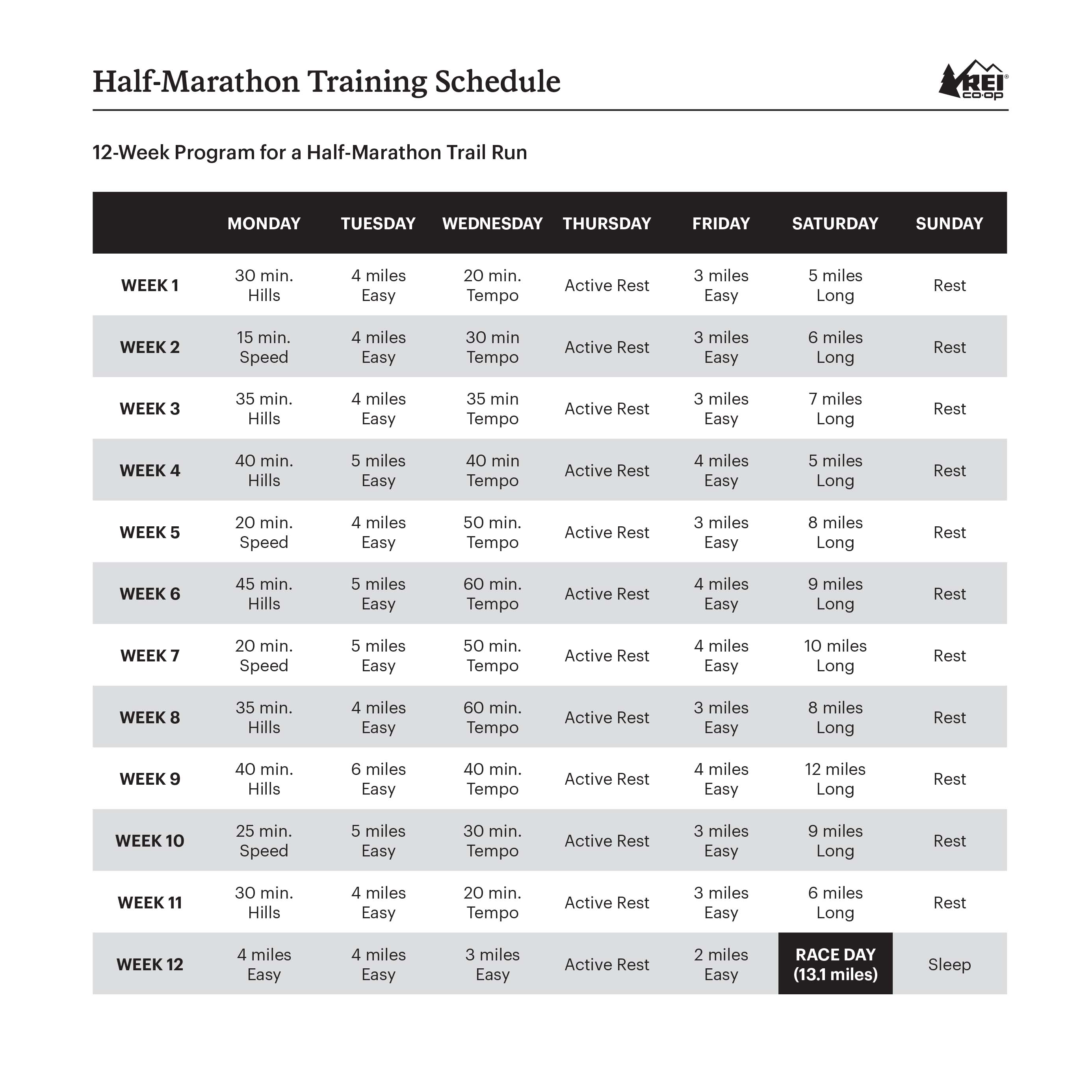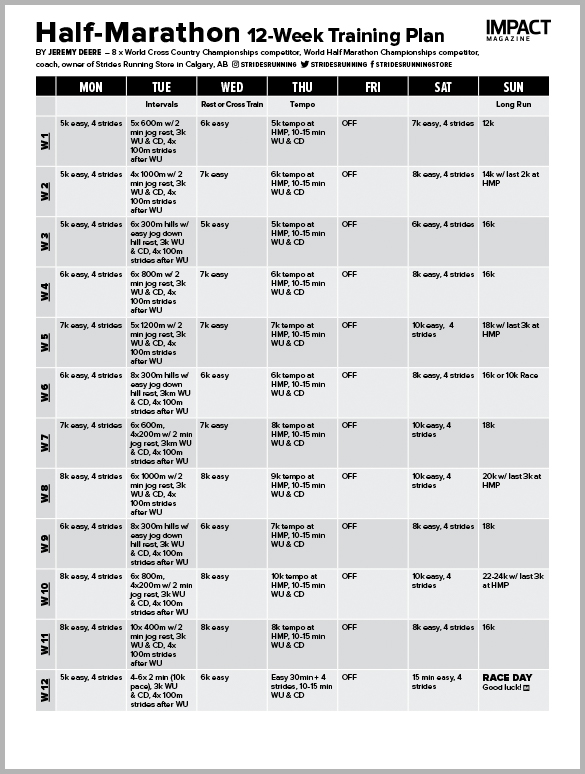Imagine this: the starting horn blares, the crowd roars, and you surge forward with a wave of adrenaline. Miles melt away as your breath comes easier, your legs find their rhythm, and a sense of accomplishment fills you. You’re not just running a race, you’re on a journey – a testament to your dedication and strength. This is the world of the half marathon.

Image: otrabalhosocomecou.macae.rj.gov.br
Whether you’re an experienced runner seeking a new challenge or a beginner eager to push your limits, the allure of the half marathon beckons. Completing 13.1 miles is a significant milestone – a victory over self-doubt and a celebration of your ability to achieve the extraordinary. But more than the finish line, it’s the journey you take, the training you endure, that makes this experience unforgettable. This guide will provide you with a comprehensive 12-week training plan designed to empower you, step by step, to cross that finish line with pride.
Laying the Foundation: Building Your Running Base
The first crucial step to conquering a half marathon is establishing a strong foundation. Don’t jump into high mileage too quickly – this can lead to injury and burnout. Start with a gradual increase in weekly mileage, focusing on consistent runs to build your endurance and make the process enjoyable.
Week 1-4: Building a Base
- Week 1:
- Monday: Rest
- Tuesday: Easy run (3 miles)
- Wednesday: Cross-training (swimming, biking, or strength training, 30 minutes)
- Thursday: Easy run (3 miles)
- Friday: Rest
- Saturday: Long run (4 miles)
- Sunday: Rest
- Week 2:
- Monday: Rest
- Tuesday: Easy run (4 miles)
- Wednesday: Cross-training (30 minutes)
- Thursday: Easy run (4 miles)
- Friday: Rest
- Saturday: Long run (5 miles)
- Sunday: Rest
- Week 3:
- Monday: Rest
- Tuesday: Easy run (5 miles)
- Wednesday: Cross-training (30 minutes)
- Thursday: Easy run (5 miles)
- Friday: Rest
- Saturday: Long run (6 miles)
- Sunday: Rest
- Week 4:
- Monday: Rest
- Tuesday: Easy run (6 miles)
- Wednesday: Cross-training (30 minutes)
- Thursday: Easy run (6 miles)
- Friday: Rest
- Saturday: Long run (7 miles)
- Sunday: Rest
Key Tips for Building Your Base:
- Listen to your body: Running is not a competition against others, but a journey within yourself. Avoid pushing too hard before your body is ready.
- Focus on consistency: Even a short run is better than no run. Aim for 3-4 runs per week, creating a routine that fits your lifestyle.
- Fuel your body: Consume a balanced diet with carbohydrates, protein, and healthy fats to support your training.
- Stay hydrated: Drink plenty of water throughout the day, especially before, during, and after runs.
Building Endurance: The Long Run is Your Ally
The long run is the cornerstone of half marathon training. It allows your body to adapt to the increasing mileage and prepares your muscles for the demands of race day. It’s not about speed, but about building resilience and cultivating a steady pace you can maintain over longer distances.
Week 5-12: Building Endurance:
- Week 5:
- Monday: Rest
- Tuesday: Easy run (6 miles)
- Wednesday: Cross-training (30 minutes)
- Thursday: Easy run (6 miles)
- Friday: Rest
- Saturday: Long run (8 miles)
- Sunday: Rest
- Week 6:
- Monday: Rest
- Tuesday: Easy run (7 miles)
- Wednesday: Cross-training (30 minutes)
- Thursday: Easy run (7 miles)
- Friday: Rest
- Saturday: Long run (9 miles)
- Sunday: Rest
- Week 7:
- Monday: Rest
- Tuesday: Easy run (8 miles)
- Wednesday: Cross-training (30 minutes)
- Thursday: Easy run (8 miles)
- Friday: Rest
- Saturday: Long run (10 miles)
- Sunday: Rest
- Week 8:
- Monday: Rest
- Tuesday: Easy run (9 miles)
- Wednesday: Cross-training (30 minutes)
- Thursday: Easy run (9 miles)
- Friday: Rest
- Saturday: Long run (11 miles)
- Sunday: Rest
- Week 9:
- Monday: Rest
- Tuesday: Easy run (8 miles)
- Wednesday: Cross-training (30 minutes)
- Thursday: Easy run (8 miles)
- Friday: Rest
- Saturday: Long run (12 miles)
- Sunday: Rest
- Week 10:
- Monday: Rest
- Tuesday: Easy run (7 miles)
- Wednesday: Cross-training (30 minutes)
- Thursday: Easy run (7 miles)
- Friday: Rest
- Saturday: Long run (10 miles)
- Sunday: Rest
- Week 11:
- Monday: Rest
- Tuesday: Easy run (6 miles)
- Wednesday: Cross-training (30 minutes)
- Thursday: Easy run (6 miles)
- Friday: Rest
- Saturday: Long run (8 miles)
- Sunday: Rest
- Week 12:
- Monday: Rest
- Tuesday: Easy run (5 miles)
- Wednesday: Cross-training (30 minutes)
- Thursday: Easy run (3 miles)
- Friday: Rest
- Saturday: Race Day!
- Sunday: Rest
Building Your Long Runs:
- Start slow and build gradually: Don’t try to reach your target long run distance in one week. Gradually increase your distance week by week.
- Run at a conversational pace: Your long run should be comfortable, allowing you to chat with a running buddy.
- Fuel your runs: Engage in proper long-run fueling with energy gels or chews, practicing the strategies you’ll use on race day.
- Hydrate regularly: Carried a hydration pack or stop at water stations.
Adding Speed and Strength: Sharpening Your Tools
Once you’ve established a strong base and endurance, it’s time to add speed and strength to your training. This will help you improve your running efficiency and prepare you for race day pace.
Week 5-12: Adding Speed and Strength:
- Tempo run: Run at a comfortably hard pace for 20-30 minutes, targeting a pace slightly faster than your race pace.
- Interval training: Alternating between high-intensity bursts (1-2 minutes) and recovery periods (1-2 minutes) to improve your speed and cardiovascular fitness.
- Strength training: Include exercises that strengthen your core, legs, and glutes. This enhances running form and prevents injuries.
Incorporating Speed and Strength:
- Tempo runs: Schedule tempo runs once or twice a week, focusing on maintaining a steady and comfortably hard pace.
- Interval training: Include interval workouts once a week, focusing on pushing your limits in short bursts.
- Strength training: Aim for two sessions of strength training per week, focusing on exercises that mimic running movements.

Image: www.elevate.in
The Final Push: Race Day Preparation
As race day approaches, it’s crucial to taper your training and focus on rest and recovery to ensure your body is fully prepared for the challenge.
Week 11-12: Race Day Preparation:
- Week 11: Reduce your weekly mileage by 20-30%, focusing on easy runs and cross-training.
- Week 12: Reduce your weekly mileage by 50%, focusing on rest, light stretching, and visualization of your race day performance.
- Carb Loading: Increase your carbohydrate intake a few days before the race to ensure your body has enough energy for the challenge.
- Pre-Race Preparation: Prepare your race kit (shoes, socks, clothes, hydration belt) and familiarize yourself with the race course. Get a good night’s sleep the night before the race.
Final Touches for Success:
- Race day nutrition: Fuel up with a light breakfast a few hours before the race and engage in race day hydration strategy.
- Warm-up thoroughly: Engage in a dynamic warm-up consisting of light jogging and dynamic stretching to prepare your body for the demands of the race.
- Enjoy the journey: Don’t forget to soak in the atmosphere, the energy of the crowd, and the feeling of accomplishment as you cross the finish line.
Running World Half Marathon Training Plan
Conclusion: Embrace the Challenge, Celebrate the Victory
The journey to conquering a half marathon is not a sprint, but a marathon itself. It’s about dedication, perseverance, and the unwavering belief in your ability to achieve the extraordinary. This 12-week training plan empowers you with knowledge, structure, and motivation to achieve your goals. Remember to listen to your body, fuel it wisely, embrace the challenges, and celebrate your victories, both great and small. After all, crossing that finish line is not just a physical triumph, but a testament to your mental grit and resilience – a force that will carry you through any challenge life throws your way. So, lace up your shoes, step onto the path, and prepare to conquer the half marathon. The world awaits!






